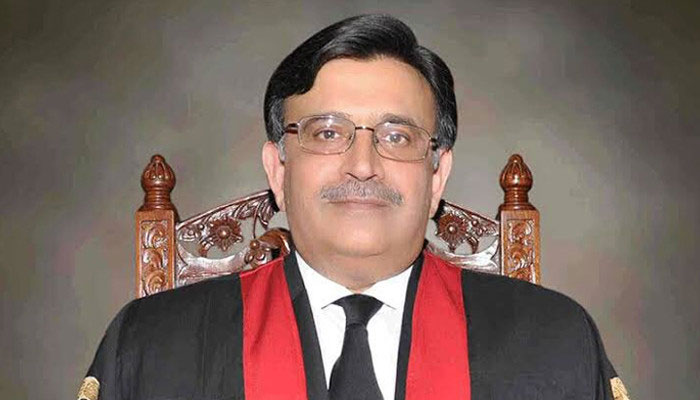CJ initiates reforms for swift, inexpensive justice
ISLAMABAD: Chief Justice of Pakistan Justice Umar Ata Bandial has initiated reforms in various organs of the apex court, especially the Case Management System, to ensure provision of speedy and inexpensive justice.
Sources informed Jang the CJ, lowering his protocol to what his brother judges have, has refused to get a BMW car and returned additional vehicles to the relevant department. For speedy justice, several committees headed by judges have been formed. A proforma has been introduced for the petitioners or advocates-on-record who apply for early hearing of cases. The applicants for early hearing would have to write down case number, title and category, a brief history of the case from subordinate to the SC, reason for seeking early hearing, the required relief and expected date hearing on the proforma that can be downloaded from the Supreme Court website. An affidavit would have to attached with the proforma to affirm whether it is first or second application.
Another proforma, also available on the SC website, has been introduced for lawyers to submit a concise statement in any case. Earlier, cases cause list was issued on Friday or Saturday which was problematic for applicants and their counsel. Now the cause list is uploaded on the website by Thursday evening.
Besides, a policy had been adopted that the benches formed in the five-day judicial work week would not be changed to ensure justice is seen to be done. Under a policy, over a dozen cases are being fixed before each bench which is gradually increasing the case disposal rate.
The Law and Justice Commission of Pakistan which formulates proposals for legislation to the government is being reactivated and Ms Rifat Inam has been appointed as its secretary. It is seen that the new CJ is kind and considerate towards petitions and lawyers.
The next CJ, Justice Qazi Faez Isa, has been made head of various administrative committees and his chamber has also been changed after which, according to sources, he has again started joining brother judges in the tea room.
Before the new CJ took over, ordinary cases were being assigned to Justice Qazi Faez Isa, but now important cases are being fixed before him. It is expected that he is going to head larger benches to hear most important cases of public interest. The legal fraternity sees ice breaking and judges’ division impression fading out completely.
Some 53,624 case were pending in the court on February 1. The number reduced to 53,286 on February 16. A large number of jail petitions has now being scheduled for hearing by the court.
The Chief Justice has reformulated the committees on administrative and judicial powers. Chief Justice Umar Ata Bandial will himself be the chairman of building committee which includes Justice Ijaz-ul-Ahsan and Justice Sajjad Ali Shah. The building committee will oversee the affairs of the building of the Supreme Court and guest houses etc. Justice Qazi Faez Esa has been appointed administrative judge of the Supreme Court research centre affairs. Justice Munib Akhtar and Justice Mansoor Ali Shah are also included in the committee. Justice Qazi Faez Isa will also be the head of law clerk programme. This committee also included Justice Mazhar Alam. The two-member committee will make recommendations for the appointment of clerks. Justice Qazi Faez Esa has also been made chairman of advocate on record enrolment committee. Justice Maqbool Baqar, Justice Yahya Afridi and Justice Qazi Muhammad Amin Ahmad are in the committee. Justice Qazi Faez Esa has also been appointed monitoring judge of Balochistan anti-terrorism courts.
Likewise, Justice Sardar Tariq Masood has been appointed monitoring judge of Islamabad anti-terrorist court, Justice Ijaz-ul-Ahsan monitoring judge of anti-terrorist courts in Punjab, Justice Mazhar Alam monitoring judge of anti-terrorist courts in Khyber Pukhtunkhwa and Justice Sajjad Ali Shah monitoring judge of anti-terrorist courts in Sindh.
It is to be mentioned here after the retirement of Chief Justice Gulzar Ahmad, Justice Ata Bandial as Chief Justice has been elected as chairman of Supreme Judicial Council, Judicial Commission of Pakistan and Law and Justice Commission. The structure of the above three has been changed completely.
According to the information given the website of Supreme Court, the Supreme Judicial Council (three Supreme Court judges) will comprise of Chief Justice Umar Ata Bandial (chairman), Justice Qazi Faez Esa and Justice Maqbool Baqar. The most senior chief justices of two high courts out of five high courts of the country are also members of it while Registrar of the Supreme Court is the secretary of the Council. The Judicial Commission of Pakistan (four judges of Supreme Court) will consist of Chief Justice Umar Ata Bandial (chairman), Justice Qazi Faez Esa, Justice Maqbool Baqar and Justice Ejazul Ahsan. The Registrar of the Supreme Court is also the secretary of the Commission.
The other members of the Commission include a retired judge of the Supreme Court, Attorney General Khalid Javed Khan, Federal Law Minister Farogh Naseem and representative of Pakistan Bar Council Akhtar Hussain Advocate. On the provincial level, Advocate General, Provincial Law Minister and a representative of provincial Bar Council are the members.
Law and Justice Commission includes Chief Justice Umar Ata Bandial (chairman), Attorney General Khalid Javed, Chief Justice Shariat Court Muhammad Noor Muskanzai, Chief Justice Sindh High Court Ahmad Ali Sheikh, Chief Justice Athar Minallah, Chief Justice Peshawar High Court Qaisar Rasheed Khan, Chief Justice Lahore High Court Muhammad Amir Bhatti and Chief Justice Balochistan High Court Naeem Akhtar Afghan, Federal Secretary Law and Justice Raja Naeem Akbar and Chairperson National Commission on Status of Women Neelofar Bakhtaran.
Addressing the Full Court Reference on the retirement of former Chief Justice Gulzar Ahmad, Chief Justice Umar Ata Bandial had advised all stakeholders to address the socio-economic issues and population explosion facing the country.
He had stated that the apex court would exercise its original jurisdiction to for prompt solution to disputes. For early disposal of cases, he had said undue adjournment of cases would be discouraged. He had also proposed “performance audit” of courts for relief to applicants.
Now the judicial vision of the CJ for provision of quick and inexpensive justice is realizing. Some 53,624 case were pending in the court on February 1. The number reduced to 53,286 on February 16. A large number of jail petitions has now being scheduled for hearing by the court.
The Chief Justice has reformulated the committees on administrative and judicial powers. Chief Justice Umar Ata Bandial will himself be the chairman of building committee which includes Justice Ijaz-ul-Ahsan and Justice Sajjad Ali Shah. The building committee will oversee the affairs of the building of the Supreme Court and guest houses etc. Justice Qazi Faez Esa has been appointed administrative judge of the Supreme Court research centre affairs. Justice Munib Akhtar and Justice Mansoor Ali Shah are also included in the committee. Justice Qazi Faez Isa will also be the head of law clerk programme. This committee also included Justice Mazhar Alam. The two-member committee will make recommendations for the appointment of clerks. Justice Qazi Faez Esa has also been made chairman of advocate on record enrolment committee. Justice Maqbool Baqar, Justice Yahya Afridi and Justice Qazi Muhammad Amin Ahmad are in the committee. Justice Qazi Faez Esa has also been appointed monitoring judge of Balochistan anti-terrorism courts.
Likewise, Justice Sardar Tariq Masood has been appointed monitoring judge of Islamabad anti-terrorist court, Justice Ijaz-ul-Ahsan monitoring judge of anti-terrorist courts in Punjab, Justice Mazhar Alam monitoring judge of anti-terrorist courts in Khyber Pukhtunkhwa and Justice Sajjad Ali Shah monitoring judge of anti-terrorist courts in Sindh.
It is to be mentioned here after the retirement of Chief Justice Gulzar Ahmad, Justice Ata Bandial as Chief Justice has been elected as chairman of Supreme Judicial Council, Judicial Commission of Pakistan and Law and Justice Commission. The structure of the above three has been changed completely.
According to the information given the website of Supreme Court, the Supreme Judicial Council (three Supreme Court judges) will comprise of Chief Justice Umar Ata Bandial (chairman), Justice Qazi Faez Esa and Justice Maqbool Baqar. The most senior chief justices of two high courts out of five high courts of the country are also members of it while Registrar of the Supreme Court is the secretary of the Council. The Judicial Commission of Pakistan (four judges of Supreme Court) will consist of Chief Justice Umar Ata Bandial (chairman), Justice Qazi Faez Esa, Justice Maqbool Baqar and Justice Ejazul Ahsan. The Registrar of the Supreme Court is also the secretary of the Commission.
The other members of the Commission include a retired judge of the Supreme Court, Attorney General Khalid Javed Khan, Federal Law Minister Farogh Naseem and representative of Pakistan Bar Council Akhtar Hussain Advocate. On the provincial level, Advocate General, Provincial Law Minister and a representative of provincial Bar Council are the members.
Law and Justice Commission includes Chief Justice Umar Ata Bandial (chairman), Attorney General Khalid Javed, Chief Justice Shariat Court Muhammad Noor Muskanzai, Chief Justice Sindh High Court Ahmad Ali Sheikh, Chief Justice Athar Minallah, Chief Justice Peshawar High Court Qaisar Rasheed Khan, Chief Justice Lahore High Court Muhammad Amir Bhatti and Chief Justice Balochistan High Court Naeem Akhtar Afghan, Federal Secretary Law and Justice Raja Naeem Akbar and Chairperson National Commission on Status of Women Neelofar Bakhtaran.
Addressing the Full Court Reference on the retirement of former Chief Justice Gulzar Ahmad, Chief Justice Umar Ata Bandial had advised all stakeholders to address the socio-economic issues and population explosion facing the country.
He had stated that the apex court would exercise its original jurisdiction to for prompt solution to disputes. For early disposal of cases, he had said undue adjournment of cases would be discouraged.
He had also proposed “performance audit” of courts for relief to applicants. Now the judicial vision of the CJ for provision of quick and inexpensive justice is realizing.
-
 Harrison Ford Reflects On Career As He Receives Life Achievement Award At 2026 Actor Awards
Harrison Ford Reflects On Career As He Receives Life Achievement Award At 2026 Actor Awards -
 Timothee Chalamet's Red Carpet Date For Actor Awards Not Kylie Jenner This Year
Timothee Chalamet's Red Carpet Date For Actor Awards Not Kylie Jenner This Year -
 Weather Forecast For Tomorrow: Wintry Mix Overnight And Warmer Temps Midweek
Weather Forecast For Tomorrow: Wintry Mix Overnight And Warmer Temps Midweek -
 Keith Urban 'solitary' Life Laid Bare After Nicole Kidman Split
Keith Urban 'solitary' Life Laid Bare After Nicole Kidman Split -
 SAG Actor Awards 2026 Winners: Complete List
SAG Actor Awards 2026 Winners: Complete List -
 UK Asylum System Faces Changes As Refugees Will Get Temporary Protection Only
UK Asylum System Faces Changes As Refugees Will Get Temporary Protection Only -
 Meghan Markle Has Realised ‘star Power’ Is Not Enough After Jordan Trip
Meghan Markle Has Realised ‘star Power’ Is Not Enough After Jordan Trip -
 USC Leading Scorer Chad Baker-Mazara Leaves Program Amid Losing Streak
USC Leading Scorer Chad Baker-Mazara Leaves Program Amid Losing Streak -
 Google Is Winding Down Popular App 'Pixel Studio': Here's Why
Google Is Winding Down Popular App 'Pixel Studio': Here's Why -
 Zendaya, Tom Holland Secretly Married?
Zendaya, Tom Holland Secretly Married? -
 Dove Cameron Reveals Why She's Limiting Relationship Talk After Damiano David Engagement
Dove Cameron Reveals Why She's Limiting Relationship Talk After Damiano David Engagement -
 Bulls Vs Bucks: Giannis Out, Simons And Williams Sidelined
Bulls Vs Bucks: Giannis Out, Simons And Williams Sidelined -
 Princess Beatrice Is ‘haunted’ By Dreadful Shamed Andrew Arrest
Princess Beatrice Is ‘haunted’ By Dreadful Shamed Andrew Arrest -
 Panthers Vs Islanders: Dmitry Kulikov Returns From Injured Reserve As Schwindt Hits IR
Panthers Vs Islanders: Dmitry Kulikov Returns From Injured Reserve As Schwindt Hits IR -
 SAG-AFTRA Drops SAG Awards Name To Rebrand
SAG-AFTRA Drops SAG Awards Name To Rebrand -
 Next Full Moon: How To Watch The Total Lunar Eclipse On March 3
Next Full Moon: How To Watch The Total Lunar Eclipse On March 3




